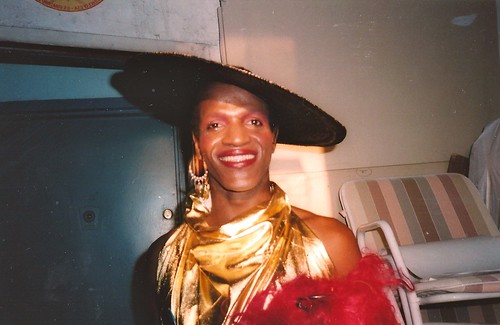
Director Roland Emmerich is defending "Stonewall" amid mounting criticism that his upcoming film whitewashes LGBTQ history by appropriating historically pivotal moments of the 1969 riots for a white audience.
I understand that following the release of our trailer there have been initial concerns about how this character's involvement is portrayed, but when this film - which is truly a labor of love for me - finally comes to theaters, audiences will see that it deeply honors the real-life activists who were there - including Marsha P. Johnson, Sylvia Rivera, and Ray Castro (source).
The trailer presents a
predominantly white cast and a fictionalized, cisgender white male as the film's protagonist, played by Jeremy Irvine.
People across the Internet erupted over the erasure of queer women of color from key roles in the Stonewall riots. One scene in particular, in which Jeremy Irvine's character, Danny Winters, is seen throwing a brick that sets off the evening's events, drew the brunt of the backlash (Washington Post).
Although eyewitness accounts vary, it is commonly believed that Marsha P. Johnson, an African American drag queen and transwoman started the 1969 riots, as well as the modern-day LGBT rights movement, by throwing the first brick.
The "Stonewall" trailer not only perpetuates the myth of the "white savior," it deprives people of color and non-binary individuals of their significance and vitality.
Rev. Irene Monroe puts this into perspective most effectively:
The upcoming film Stonewall is disturbing because of its apparent whitewashing of a historic moment that turned into a movement. When I look back at the first night of the Stonewall Inn riots, I could have never imagined its future importance. The first night played out no differently from previous riots with black Americans and white policemen. And so too, it was initially underreported. But I was there.
(...)
On the first night of the Stonewall Inn riots, African-Americans and Latinos were the largest percentage of the protesters, because we heavily frequented the Stonewall Inn. For black and Latino homeless youth and young adults who slept in nearby Christopher Park, the bar was their stable domicile. The Stonewall Inn being raided was nothing new â gay bars in the Village were routinely raided in the 1960s, but many believe the decision to raid Stonewall that fateful night happened because the police were increasingly incensed by how many LGBT people of color hung out there.
The Stonewall riots of June 27-29, 1969, in Greenwich Village started on the backs of working class African-American and Latino queers who patronized that bar. Those brown and black LGBTQ people are not only absent from the photos of that night but have been bleached from its written history. Many LGBTQ blacks and Latinos argue that one of the reasons for the gulf between whites and themselves is about how the dominant queer community rewrote and continues to control the narrative of Stonewall (The Advocate).

Marsha P. Johnson deserves more respect than a supporting character in a whitewashed adaptation of herstory.
Marsha 'Pay it no Mind' Johnson passed away on July 6, 1992. Her body was found in the Hudson River in New York. Police and investigators ruled her death as a suicide, but people who knew her and were close to her insisted she was not suicidal. Witnesses saw Marsha being harassed earlier in the day and wanted a full investigation of her death as a murder. There has been no criminal investigation.
Additional Reading:
Stonewall is in our blood: How the new film’s white gay hero is the latest effort to erase trans activists of color


